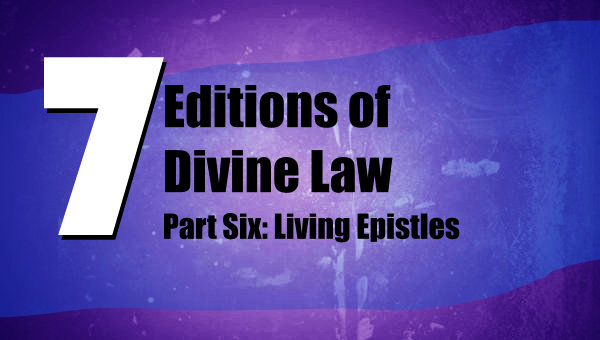By Tyson Thorne

It's been an enlightening journey. but now we finally, come to the seventh and final edition of divine law: Believers as living epistles. As strange as it sounds, it is what Paul relates to the church of Corinth in his second letter, chapter three, verses two and three, “You yourselves are our letter, written on our hearts, known and read by everybody. You show that you are a letter from Christ, the result of our ministry, written not with ink but with the Spirit of the living God, not on tablets of stone but on tablets of human hearts.”
As you likely know, an epistle is a letter. Today letters are mostly personal things, sealed and delivered to one other person. Many private things are communicated in letters, but the same cannot be said for letters in Paul's day. To Paul, an epistle was written to a group (in this case a church) and intended to be read aloud, publically. In fact, all of Paul's letters were copied and distributed among the churches. So when he calls us "living epistles" he intends for us to be sent to, and read by, many.Another characteristic of letters, is that they must be legible. When writing, Paul usually dictated his letters to an amanueniss, which is a fancy word for stenographer. The last paragraph Paul would usually srite himself, as a form of signature so that the churches would know it was legitimately from him. Some people are known for their poor handwriting, but this is not to be the case with living epistles. Our lives ought to be clearlly written, but just like with handwriting some of our lives are not clearly Christian. We improve our penmanship by living rightly and living rightly means obeying God's divine law. The divine law is something we've talked about a lot over the last two weeks, now it is time to detailed what that law is. Natural revelation is delivered through the natural world. Seeing the complexity of the universe, one would naturally assume that it was created by a superior being. God's superiority and creativity are clearly evident. There is more, of course. The more we study nature the more we understand that the Creator is a God of order, that he is highlly intelligent, and that there is an order not only to stars and planets but also among male and female in both the human and animal realms. So God is personal as well. As Sir Arthur Conan Doyle observed through his fictional detective Sherlock Holmes, one may also deduce that God is caring and loving because he gives us things of beauty that we do not need for our existence. Some believe all the spectacular stuff Special revelation is what God tells us about himself. The 10 Commandments fall into this category, as does Jesus and the Bible. From these sources we can know even more about God. His holiness, his righteousness, his love for us and expectation of reciprocal love, his sinlessness, his triune nature and his plan to redeem humanity all come from special revelation. We embrace the Bible as God's testimony about himself and his plans, but many in our school or workplace don't have a Bible to consult, nor would they necessarily believe it if they did. For them, we are the revelation of God.Some believe all of God's more spectacular activity happened in the Old Testament. God did reveal himself in some pretty amazing ways, especially in regard to the events leading up to the giving of the 10 Commandments. A pillar of cloud by day and a pillar of fire by night, are you kidding me? But the New Testament has it's shock and awe moments too. Imagine Jesus with three disciples on a mountain, with Mosesand Elijah coming to pay a visit (Matthew 17). This is one of the most important events in history, and it never gets the press it deserves. Observe:
"We ourselves heard this voice that came from heaven when we were with Him on the sacred mountain. And we have the word of the prophets made more certain" (2 Peter 1:18-19).
Without this pivotal event, there is no telling where Christianity might be. Just as Jesus, transfigured on the mountain, shone like a great light so to are we to shine brightly. Our lives are to reflect all that God is. It's a tall order, I know, but it is God's plan for your life. The best part is, the more like God we become — in every way including love for others and rejection of sin in our own lives, the more legible our letter becomes to others.
|
|
